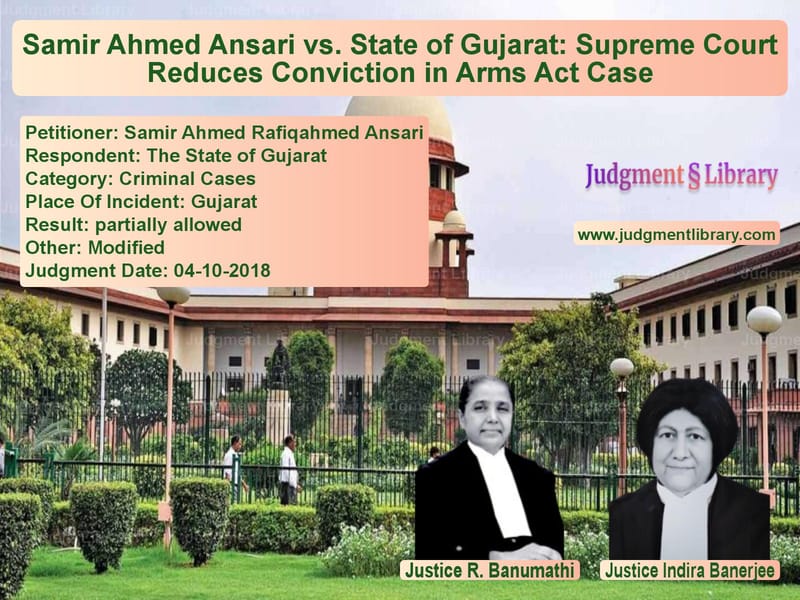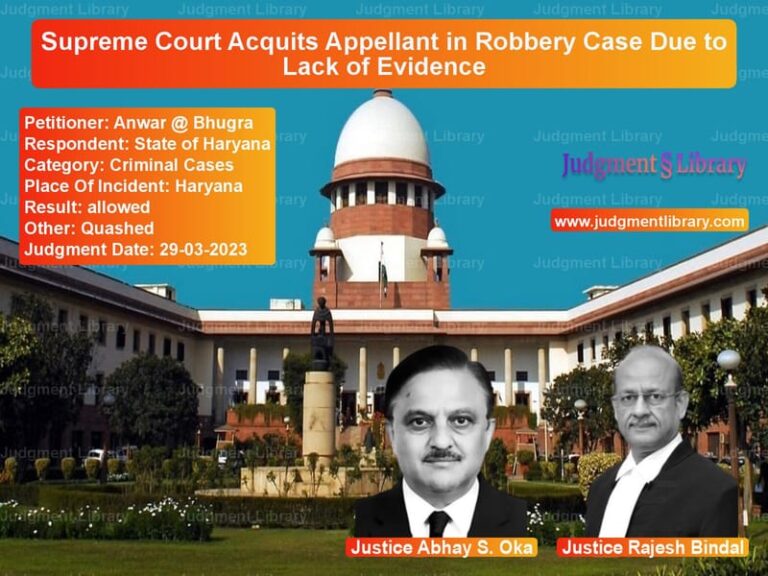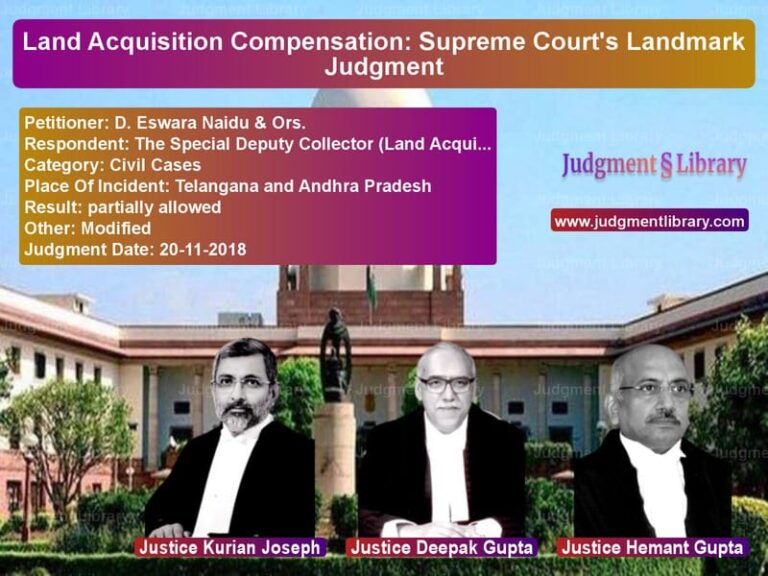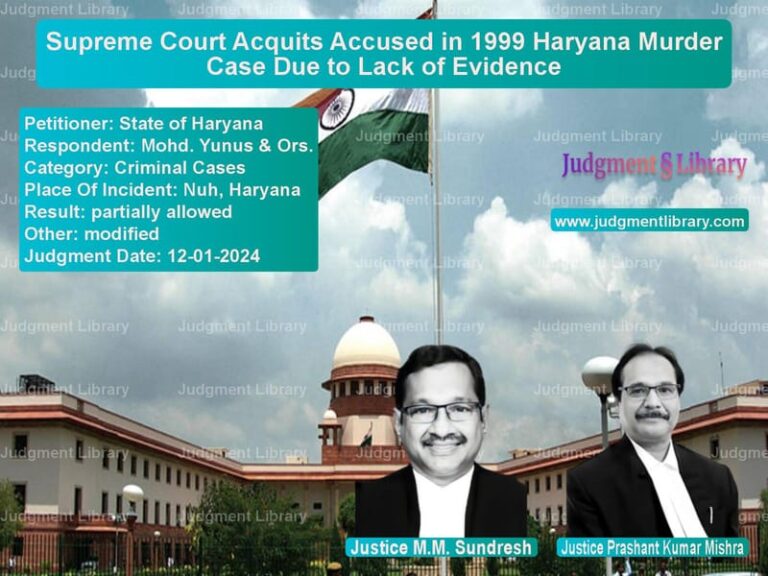Samir Ahmed Ansari vs. State of Gujarat: Supreme Court Reduces Conviction in Arms Act Case
The case of Samir Ahmed Rafiqahmed Ansari vs. The State of Gujarat is a crucial judgment concerning illegal possession of firearms under the Arms Act, 1959. The Supreme Court of India, in its judgment dated 4th October 2018, modified the appellant’s conviction from Section 25(1AA) to Section 25(1B)(a) of the Arms Act and reduced his sentence to the period already undergone.
Background of the Case
The case originated from an incident on 18th October 2002, where the appellant, Samir Ahmed Ansari, was apprehended while carrying a country-made pistol loaded with live cartridges. The police also recovered two additional live cartridges from him. Following this, a case was registered against him under the following sections:
- Section 399 IPC (Preparation to commit dacoity).
- Section 120B IPC (Criminal conspiracy).
- Section 25(1AA) of the Arms Act (Manufacture, sale, transfer of prohibited arms and ammunition).
After the completion of the investigation, the charge sheet was filed, and the trial commenced.
Trial Court Verdict
The Trial Court acquitted the appellant of all charges under the Indian Penal Code but found him guilty under Section 25(1AA) of the Arms Act, sentencing him to two years of rigorous imprisonment. The co-accused were acquitted of all charges.
High Court Proceedings
The appellant challenged his conviction before the Gujarat High Court. Simultaneously, the State of Gujarat filed an appeal seeking an enhancement of the sentence. The High Court:
- Upheld the conviction under Section 25(1AA) of the Arms Act.
- Increased the sentence from two years to seven years rigorous imprisonment.
Aggrieved by the High Court’s decision, the appellant approached the Supreme Court.
Arguments by the Petitioner (Samir Ahmed Ansari)
The appellant’s counsel, Ms. Kamini Jaiswal, contended:
- The conviction under Section 25(1AA) was incorrect as there was no evidence of manufacturing or dealing in prohibited arms.
- The appellant was merely found in possession of a country-made pistol, which falls under Section 25(1B)(a), not 25(1AA).
- The lack of sanction under Section 39 of the Arms Act rendered the conviction questionable.
- The appellant had already served one and a half years in prison.
Arguments by the Respondent (State of Gujarat)
The State of Gujarat, represented by Ms. Jesal Wahi, countered:
- The appellant was in illegal possession of a firearm, which justified his conviction under Section 25(1AA).
- The presence of live cartridges indicated that the appellant intended to use the firearm.
- The trial and High Court correctly applied the law.
Supreme Court Judgment
The Supreme Court analyzed the applicability of Section 25(1AA) and observed:
- This section deals with the manufacturing or trafficking of prohibited arms, which was not proven in the case.
- The prosecution failed to present evidence that the appellant engaged in making or transferring weapons.
- The facts only established possession, which falls under Section 25(1B)(a).
The Court thus ruled:
“The prosecution has not adduced any evidence to show that the appellant-accused had indulged in manufacturing of arms or prohibited ammunition in contravention of section 7. Since the prosecution has not adduced any evidence to substantiate the allegation of manufacture, in our view, the conviction of the appellant-accused under Section 25(1AA) cannot be sustained.”
Final Judgment
The Supreme Court modified the conviction and sentence as follows:
- The conviction was changed from Section 25(1AA) to Section 25(1B)(a) of the Arms Act.
- The sentence was reduced to the period already undergone.
- The appellant, who was out on bail, was discharged from all further liabilities.
Legal Precedents and Significance
This judgment follows established legal principles concerning firearm offenses:
- Possession of firearms must be carefully distinguished from manufacturing or trafficking.
- A wrongful conviction under a severe section can lead to unnecessary imprisonment.
- The prosecution must present clear evidence to support each specific charge.
Conclusion
The case of Samir Ahmed Ansari vs. State of Gujarat is a landmark ruling in firearms law interpretation. It highlights the need for judicial scrutiny in classifying offenses under the Arms Act, ensuring that punishments are proportionate to the crime. The Supreme Court’s decision to modify the conviction prevents misapplication of severe penalties where the evidence does not justify it.
Petitioner Name: Samir Ahmed Rafiqahmed Ansari.Respondent Name: The State of Gujarat.Judgment By: Justice R. Banumathi, Justice Indira Banerjee.Place Of Incident: Gujarat.Judgment Date: 04-10-2018.
Don’t miss out on the full details! Download the complete judgment in PDF format below and gain valuable insights instantly!
Download Judgment: Samir Ahmed Rafiqahm vs The State of Gujarat Supreme Court of India Judgment Dated 04-10-2018.pdf
Direct Downlaod Judgment: Direct downlaod this Judgment
See all petitions in Drug Possession Cases
See all petitions in Bail and Anticipatory Bail
See all petitions in Judgment by R. Banumathi
See all petitions in Judgment by Indira Banerjee
See all petitions in partially allowed
See all petitions in Modified
See all petitions in supreme court of India judgments October 2018
See all petitions in 2018 judgments
See all posts in Criminal Cases Category
See all allowed petitions in Criminal Cases Category
See all Dismissed petitions in Criminal Cases Category
See all partially allowed petitions in Criminal Cases Category







